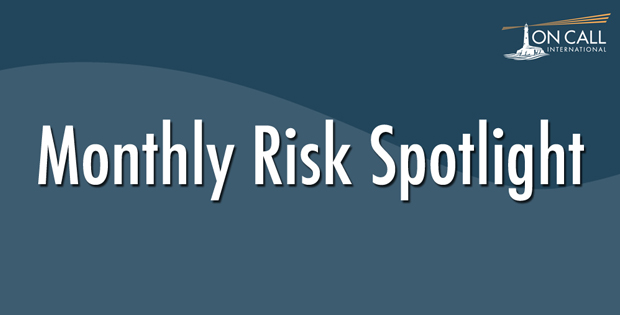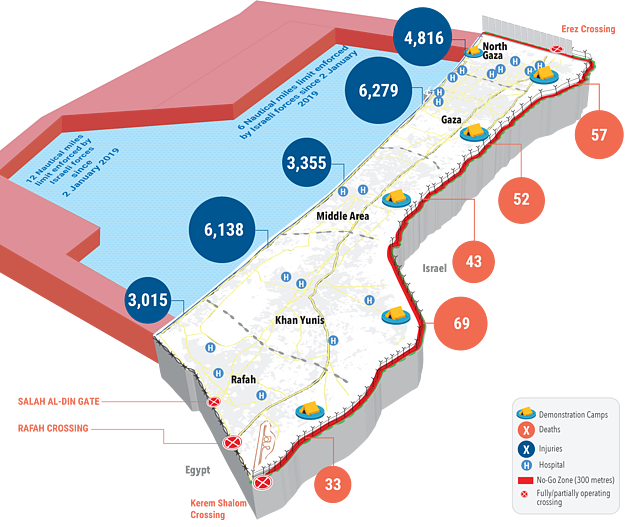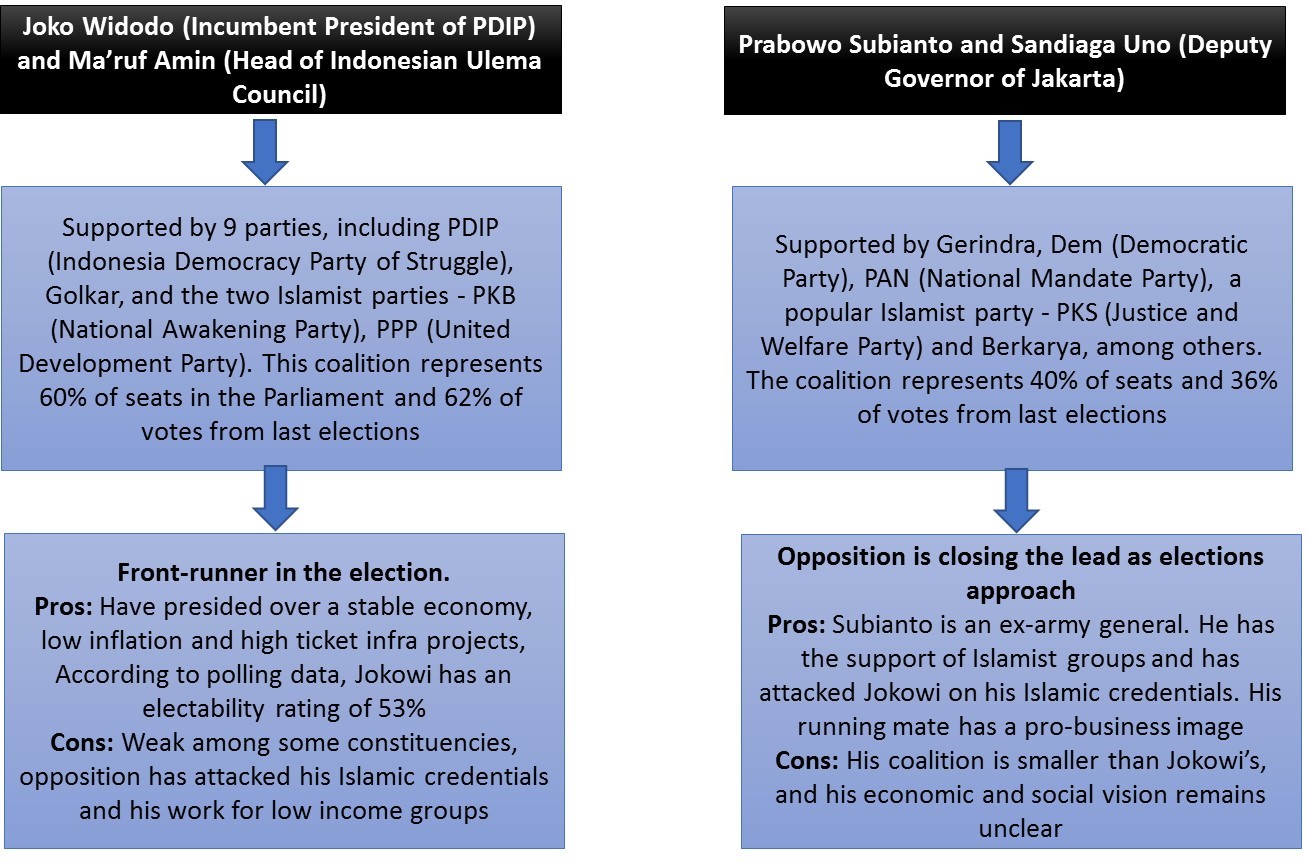Author: On Call International’s Global Security Team
On Call International’s Monthly Risk Spotlight highlights events of heightened importance in assessing risk to travel and operations abroad.

The Americas
Nicaragua – A Deepening Multi-Dimensional Crisis is Destabilizing the Country
The intensifying public protests against the Ortega administration that started in 2018, after the introduction of unpopular pension reforms, has led to an economic deterioration in Nicaragua. The country’s economic crisis has become severe in the last few months, due to an inept political handling of major issues.
Nicaragua is currently facing a three-tiered crisis – economic, political, and social – that is likely to destabilize the country further.
Economic Crisis: Since the protests began in mid-2018, international pressure has increased on the government to hold early elections. However, instead, the Ortega administration introduced a significant tax overhaul at the end of January, including higher income taxes and social security contributions. The tax overhaul was aimed at restoring the government’s empty coffers. This has further fuelled the socio-economic crisis that began in April 2018. Moody’s has downgraded Nicaragua’s B2 credit rating to “negative” from “stable” due to the debt burden and tight liquidity. Some analysts have predicted the ongoing political crisis is likely to result in capital flight and reduction in Foreign Direct Investment, which will shrink the GDP by 1.8 percent in 2019.
Political Crisis: To maintain his supremacy, the Ortega administration has arrested opponents, repressed government institutions, and shut down media houses to rein in an unbiased reporting of the protests. President Ortega has refused to step down and has ruled out early elections, thus worsening the political and economic situation. With U.S. sanctions in place and failed talks with the opposition, the business community has also turned against President Ortega. It is unlikely President Ortega will negotiate a political agreement in the next few months to bring the country out of this crisis. Currently, Nicaragua has become autocratic and dictatorial with only two major political figures – President Ortega and his wife, the Vice President Rosario Murillo.
Social Crisis: According to statistics released in December 2018 by the Miami Herald, more than 120,000 Nicaraguans have lost their jobs since April – analysts predict this figure will double in 2019. Many have been forced to move to nearby countries. According to reports, human rights violations and crimes against children and women have escalated in the last couple of months. Ortega has gagged the media houses, and journalists have been given an option of exile or a jail sentence. Hence, it has become difficult to determine the extent of the protests. However, when Supreme Court Judge Rafael Solis resigned in January 2019, he stated that Nicaragua is on the brink of a civil war.
Middle East and North Africa
Tensions Rise on Gaza Strip and Israel Border
Tensions escalated at the Gaza Strip in February 2019, as part of the “March of Return” protests. This resulted in clashes between the Palestinian protesters and Israeli soldiers and led to multiple deaths. Tensions are also high in Jerusalem, with protestors praying at the contentious Al-Aqsa Mosque, which is a disputed holy site for both Jews and Muslims. Israeli authorities arrested 60 Palestinians for causing disturbance and violence. Considering Israel’s upcoming Knesset elections (April 2019) and rising turmoil, tensions and protests are likely to escalate.

Image: UN OCHA-OPT
Tracing the Causes
The Palestinians in Gaza started the “March of Return” protests at the Israeli border on 30 March 2018 to demand an end to Gaza’s blockade. These protests were imposed by Israel and Egypt after Hamas gained control in 2007. While starting as a six-week “non-violent demonstration,” protests have continued weekly, with rioters throwing grenades, rocks, Molotov cocktails, and also using balloons to cause crops to burn in Israel. Protests escalated in May 2018 when the U.S. shifted its embassy from Tel Aviv to Jerusalem.
Israeli border forces have used tear gas and gunfire to control protestors, accusing Gaza’s rulers – Hamas – of using demonstrations as a cover for attacking troops and breaching the fence. The international community has criticized Israel for the use of excessive force, with over 200 protestor deaths per UN data.
A Potential Financial Crisis in Gaza
Under an unofficial ceasefire with Israel, Qatar agreed to fund $90 million to Hamas in installments of $15 million, $10 million for civil servants, and the rest in $100 bills to citizens. The transfer of funds in November and December led to fewer protests, but funds were then blocked by Israel, citing balloon bombs from Gaza.
Later when lifting this halt, Israel ruled that $5 million in bills would instead be given as “logistical assistance,” rather than cash. Due to this, Hamas rejected these funds and demanded that Qatar increase the grant to $22 million to support a power plant. Meanwhile, the aid sent by the West Bank’s Palestinian Authority (PA) is also under threat, as President Abbas wants to stop payment to make Hamas cede control of Gaza back to PA.
Israeli intelligence believes this halting of funds from Qatar and PA (as threatened by President Abbas) would lead to financial crisis, causing Hamas to start a conflict with Israel in Gaza, Judea, and Samaria. However, the conflict is unlikely to spread to the West Bank.
Preparation for Upcoming Elections in Israel
Expecting an escalation of hostilities in the run-up to April elections, Israeli security forces have been preparing operational plans for combat, reinforcing troops, deploying surveillance balloons, and revamping training exercises. IDF is prepared to target potential targets in Gaza and has deployed two Iron Dome anti-missile batteries, to be increased to ten and eight in reserve.
According to reports, Hamas has beefed up subterranean tunnels beneath Gaza and recruited cells in the West Bank to undermine President Abbas’s rule. Rising tensions and continued protests have the potential to destabilize the region further.
Asia Pacific
Indonesian Elections
Indonesian elections are scheduled to be held on 17 April 2019. These are being touted as a rematch of the 2014 election between the two presidential candidates Joko Widodo (Jokowi) and Prabowo Subianto. However, as compared to 2014, the race is different now, and several factors are likely to have an impact on the elections and the Indonesian democratic ethos. For one, while the issues of the economy, energy, and infrastructure remain relevant, religion has taken the center stage, with both the challenger and the incumbent attempting to appease hard-line Islamist groups. Second, both candidates have upped the ante on populism, including the much-needed economic reforms. In addition, the menace of “fake news” and attempts to counter it with “questionable legislation” has undermined faith in government institutions.
Indonesian Presidential Elections Landscape

Analysis of polls, track records, and campaign strategies indicate that Jokowi is likely to be re-elected for a second term. However, Jokowi is being challenged on two aspects – neglecting the interests of the poor, and his failure to accommodate hard-line Islamist groups, which have grown vocal in Indonesian politics. The opposition strategy has been to ally with the hardline Islamist groups and use street protests and Islamic identity politics to question Jokowi’s Islamic credentials. This was a strategy the opposition perfected in the 2017 Jakarta gubernatorial elections to oust the incumbent governor of Jakarta, a Christian allied with Jokowi. Jokowi has responded by choosing a conservative cleric, Ma’ruf Amin, as his VP candidate. Amin, the head of the conservative Indonesian Ulema Council (MUI), has spoken out publicly against the minorities, LGBTQ rights, and the values of “liberal secularism.”
On the charge of neglecting inequality, President Jokowi has responded by populist measures leading to a slowdown in economic reforms. These included a range of import-restriction measures, delaying of infrastructure projects, and the lowering of gas prices—all of which the cash-strapped state giant Pertamina will be forced to absorb. An increase in energy subsidy bill and social spending (Budget 2019) is likely to impact fiscal discipline at a time of slowing global growth and volatility in the rupiah. Through his own populist measures, Prabowo has made promises of a more people-centered model of economic development, but without any definite plans.
Also, fake news and “misinformation’/’disinformation” campaigns have continued to undermine the popular faith in the government. Whether it is the cyber wings of Islamic groups or the “black campaigns” run during election periods, misinformation has been responsible for instances of violence, protests, and unlawful behavior. Some of the attempts by the government to control the spread of fake news have been controversial, and activists fear these could become the basis of political repression.
As of now, Jokowi retains a lead in the upcoming elections. However, his attempts at the appeasement of Islamic groups and dissatisfaction of the lower-income groups can lead to narrowing the gap by costing the votes of new and swing voters and moderate Muslims. Regardless of the election’s outcome, trends of religious polarization and populist rhetoric will require close monitoring in the coming months.
Europe and the Central Independent States
To Exit or Not to Exit the EU; the Brexit Confusion Continues
As the 29 March deadline approaches, Britain stands unprepared for its scheduled exit from the EU. In January, Prime Minister Theresa May faced a defeat in the Parliament on a vote on her negotiated deal and subsequently on a plan B. While she has attempted to further negotiate with EU leaders, her authority and capability to offer compromises has been severely limited. May faces a divided party, with some ministers wanting an extension of the deadline, while Brexitee MPs are willing to settle for a no-deal exit.
SCENARIO 1: BREXIT WITH DIFFERENT DEAL or DEADLINE EXTENSION
EU leaders have refused to offer any significant changes to the negotiated deal. May is believed to be using the deadline as a pressure ploy for both Brussels and the Parliament to accept a last moment deal to save from no-deal chaos. This includes a time limit on the backstop to satisfy Conservative MPs and guarantees on workers’ rights and environmental standards to satisfy some Labour MPs, all to cobble a majority. May has twice asked the Parliament to give her more time to negotiate and has now set a deadline of 12 March for her revised deal to go through the final vote.
There have been calls for a deadline extension, which May has repeatedly rejected. However, given the uncertainties in the existing scenario, officials on both sides are advocating this position. Currency traders are betting that the exit will be delayed. While an extension is likely to be opposed by pro-leave Conservative Brexiteers, it could reduce the no-deal shock by allowing the EU and the UK to negotiate deals on trade, aviation, food, and medicines.
SCENARIO: SECOND REFERENDUM
Currently, there is no majority in the Parliament for a second referendum. May has ruled out this possibility as she feels it will lead to further chaos and subsequent calls for another referendum. Labour insists on a general election and then a deadline extension to ensure a second referendum. While a second referendum might lead to a “remain” verdict, it would likely be by a narrow margin, which could render the UK incapable of meaningfully engaging with the EU.
SCENARIO: NO-DEAL
In the increasingly likely no-deal scenario, Britain is expected to face shortages of food, produce, medicines, and other critical items, since the UK imports over half of its food supply from the EU. Hoarding and stockpiling has already started among consumers and businesses. At Dover port, which sees 10,000 trucks/day, customs checks will be applied overnight, and two-minute checks can lead to 17-mile traffic.
Airlines and manufacturers have said they need nine months to plan if talks collapse, and over 10,000 aircrafts would be grounded overnight. No-deal Brexit would mean Northern Ireland’s economy would shrink by four to nine percent. Further losses of jobs and investments are inevitable, with firms moving away due to Brexit uncertainties and higher costs. Since the Brexit vote, Britain has fallen from the top to the bottom of G7 leading economies, and the British Pound has weakened by almost 14 percent.
Burkina Faso: Escalating Terrorism Threatening the Holistic Development of Burkina Faso
Terrorism has evolved to threaten stability in Burkina Faso West Africa, which was a “safe oasis” until three years ago. In January, six major terrorist attacks were reported. About 1,000 schools have been forced to close due to terrorism. This threat has also spread to foreign establishments and foreign nationals, with two high-profile kidnappings reported in January. A Canadian national kidnapped by gunmen at a mining site was found dead after being missing for three days. In the second incident, a Canadian and an Italian national have been missing since December 2018. Evidently, the transnational anti-terrorism military force G5 Sahel Force has been inept in containing the terrorist threat. The terrorist threat has grown due to interweaving political, social, and geographic factors threatening Burkina Faso’s development and stability in the long term.
Political Crisis – The political structure faces multi-dimensional challenges including security, development, and growth of the country. Following the series of terrorist incidents in January, there were mass resignations, including that of the prime minister. Subsequently and amidst security tensions, President Kabore appointed a new prime minister, Christophe Joseph Dabire. However, the new structure did not help in containing terrorist activities. Deteriorating humanitarian and social indices, as well as insufficient military capabilities, have undermined the legitimacy of the state and led to increased support for certain terror outfits.
Geographical Challenges – Terrorism has spread rapidly to the northern and the eastern parts of the country – both neglected by the central government. Government negligence has acted as a catalyst in increasing organized crime, thus facilitating terrorist expansions. Additionally, the geography of the region and the allegations of extrajudicial killings against the Burkinabe military have weakened the efforts to thwart the terrorist activities. Hence, terrorists use the area as a launchpad for attacks in Burkina Faso.
Need help assessing the global risks affecting your travelers? Contact us today.


